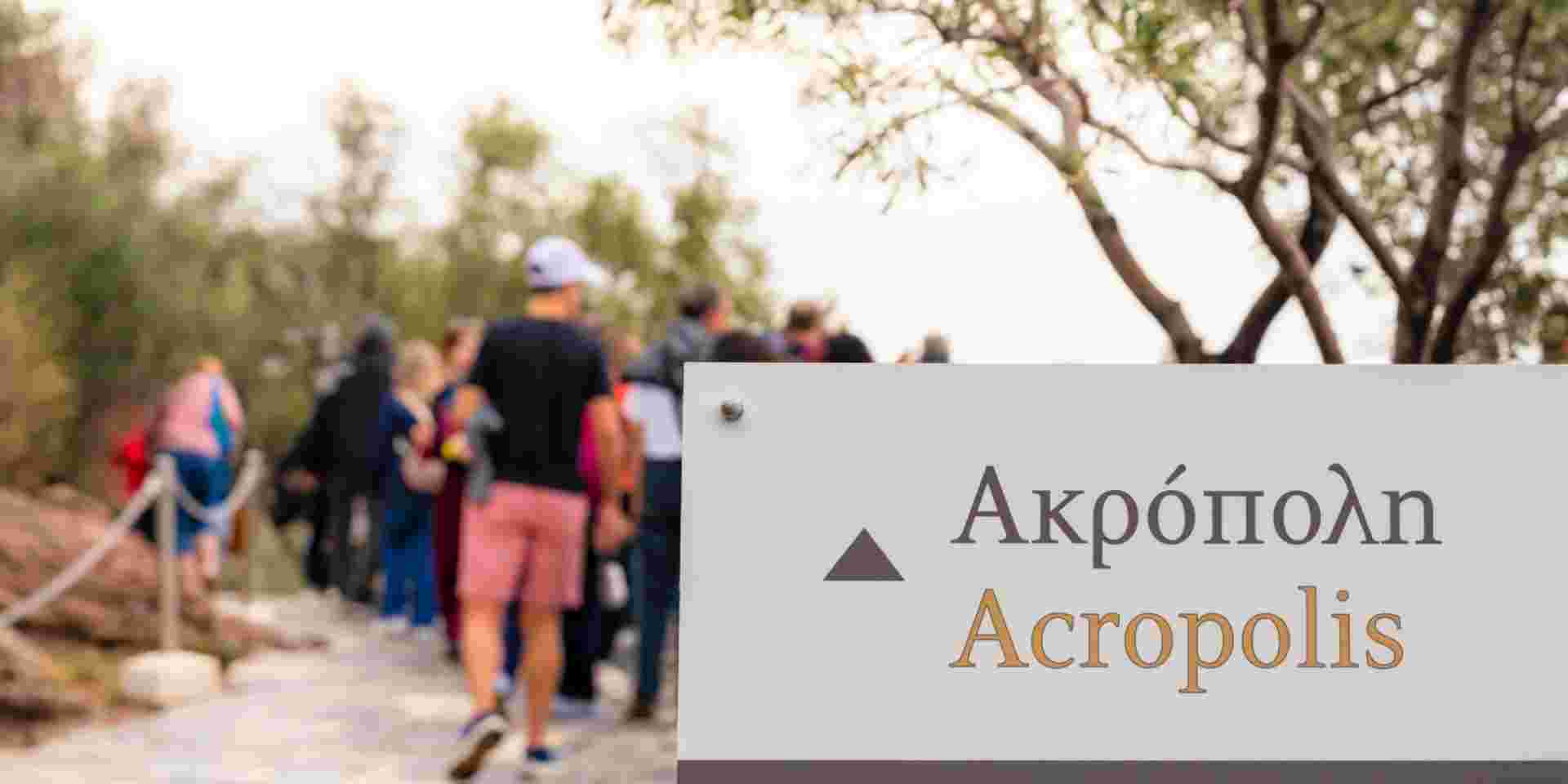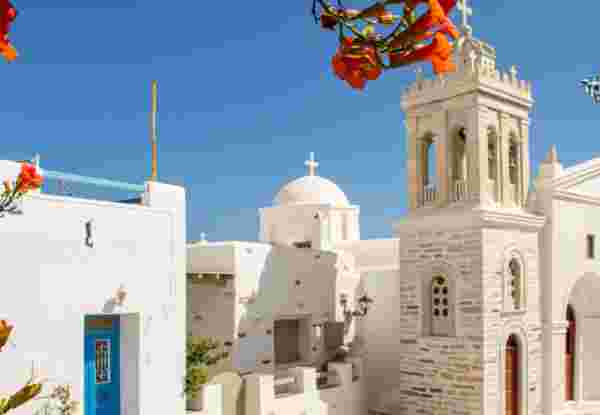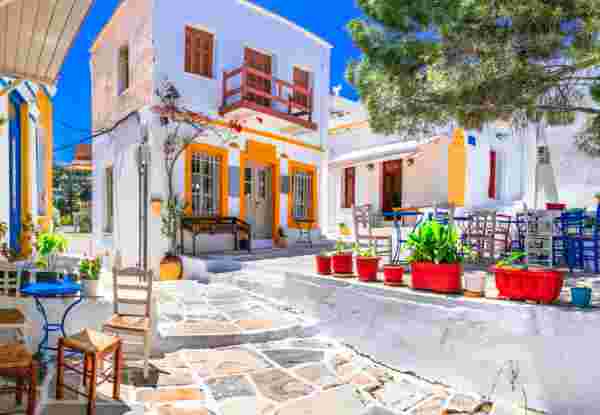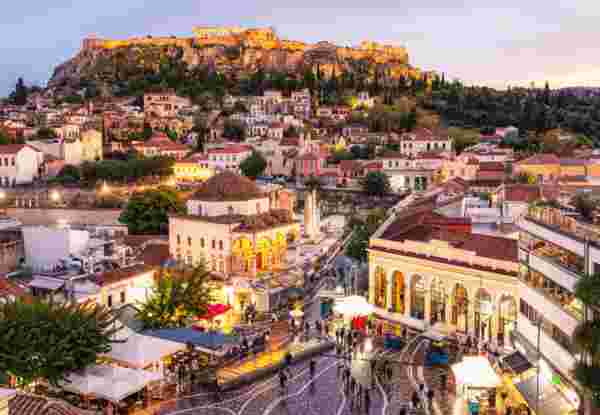Answered: Do They Speak English in Greece?

Are you planning a trip to Greece and wondering if you’ll need to brush up on your Greek? Don’t worry! While Greek is the official language, English is a very common language in Greece, especially in tourist areas. So, if you were wondering “Do they speak English in Greece?” in short, yes, Greeks speak English! Many Greeks speak English as a second language, making it easy to navigate and communicate in popular destinations.

Understanding English Usage in Greece
English is widely spoken across Greece, largely due to its inclusion as a mandatory second language in Greek schools from a young age. This means that younger generations and those working in the tourism industry are particularly proficient in English.
However, fluency levels vary. In urban areas and tourist hotspots, you’ll encounter a higher concentration of fluent English speakers. Meanwhile, in rural areas, English usage might be less common, though basic communication is usually possible.
Prevalence of English in Urban vs. Rural Areas
In urban areas like Athens, Thessaloniki, and other major cities, English is widely spoken, particularly by younger generations. You’ll find that most people working in hospitality, tourism, and service industries are comfortable communicating in English. Street signs, restaurant menus, and public transportation information are also often available in both Greek and English.
Venturing into rural areas, you’ll notice a decline in English fluency, particularly among older generations. However, even with limited English, Greek people are incredibly hospitable and will find ways to assist you.
Remember that learning a few basic Greek phrases can greatly enhance your interactions and show respect for their culture, even if your Greek is limited.
Which Greek Islands speak English?
If you are conserned about the language barriers the best islands to visit in Greece are the popular tourist destinations like Crete, Santorini, and Mykonos have higher English proficiency. However, English is also spoken in Rhodes and Corfu. These islands cater to international visitors, making communication easier for English speakers.
English-speaking doctors in Greece
When it comes to healthcare, finding English-speaking doctors in Greece is generally not a concern, especially in tourist areas and larger cities. Many Greek doctors receive medical training aligned with international standards, and speaking English is often part of their education.
In popular tourist destinations, hospitals, and clinics often have English-speaking staff to cater to the needs of international visitors. If you require medical assistance, don’t hesitate to ask for an English-speaking healthcare professional.
It’s also a good idea to carry essential medical information, including any allergies or pre-existing conditions, translated into Greek to ensure clear communication.

Essential Greek Phrases for English Speakers
While English will likely suffice for most of your interactions in Greece, learning a few basic Greek phrases can go a long way in enhancing your travel experience. It’s a sign of respect for the local culture and can lead to more authentic interactions with locals.
From greetings to simple courtesies, even a few words of Greek can make a difference.
Greetings and Basic Courtesies
Mastering a few basic greetings and polite expressions in Greek is a great way to make a positive impression. Here are some essential phrases:
- Good morning: Kaliméra (Καλημέρα)
- Good evening: Kalispéra (Καλησπέρα)
- Hello/Goodbye: Yia sou (Γειά σου) – Informal
- Please: Parakaló (Παρακαλώ)
- Thank you: Efharistó (Ευχαριστώ)
- You’re welcome: Parakaló (Παρακαλώ)
- Excuse me: Signómi (Συγγνώμη)
- Yes: Ne (Ναι)
- No: Óchi (Όχι)
Using these simple phrases can demonstrate your willingness to engage with the local culture and create more meaningful connections with the Greek people.
Don’t be afraid to try them out! Greeks appreciate the effort even if your pronunciation isn’t perfect.
Navigational Phrases and Questions
Navigating your way around Greece is relatively easy, even if you don’t speak Greek. Tourist areas usually have signage in English, but learning a few navigational phrases can be helpful, especially for public transport:
- Where is…? Pou eínai…? (Πού είναι…;)
- How much does it cost? Póso kostízei? (Πόσο κοστίζει;)
- The bus station: O stathmós ton leoforíon (Ο σταθμός των λεωφορείων)
- The train station: O stathmós ton trenson (Ο σταθμός των τρένων)
- The airport: To aerodrómio (Το αεροδρόμιο)
Remember to keep your hotel’s address written down in Greek. This will be extremely helpful when communicating with taxi drivers or asking for directions.

The Role of English in Greek Tourism
Tourism is a significant pillar of the Greek economy, and English plays a crucial role in supporting this industry. Tourist attractions, hotels, restaurants, and tour operators recognize the importance of catering to English-speaking visitors.
You’ll find that English is seamlessly integrated into the tourism infrastructure, making it easy for English speakers to explore Greece’s rich history, culture, and natural beauty.
Communicating in English at Tourist Attractions
Visiting Greece’s iconic tourist attractions like the Acropolis, Delphi, or ancient Olympia is an incredible experience. You’ll be relieved to know that communicating in English at these sites is typically hassle-free.
Most historical sites and museums provide information panels, brochures, and audio guides in multiple languages, including English. Tour guides are also generally fluent in English, offering insightful tours and explanations.
If you have any questions or need assistance, don’t hesitate to approach staff members, who are usually well-equipped to communicate in English.
English Usage in Hospitality and Services
English proficiency in Greece is prominent within the tourist industry and larger cities. In tourist areas and resort destinations, you’ll find many locals who speak fluent English to cater to visitors. The hospitality industry places a strong emphasis on communication with tourists, ensuring a comfortable experience for English speakers. Service providers often have good English language skills to assist foreign visitors effectively. In areas frequented by tourists, like Athens Airport or historical sites, English-speaking staff is common. The younger generations tend to be more adept in English, making communication easier in the hospitality sector. Overall, when traveling in Greece, interacting with locals in English for services and assistance is usually convenient.
Digital Tools and Resources for English Speakers
In today’s digital age, several handy tools and resources can bridge the language gap and ensure smooth communication while traveling in Greece.
Translation Apps and Language Guides
Don’t leave home without arming yourself with a few essential digital tools:
- Google Translate: This versatile app is a lifesaver for quick translations of text, speech, and even images. Download Greek for offline use, especially in areas with limited internet access.
- Translation Apps: Explore other translation apps like Microsoft Translator or iTranslate, which offer features like phrasebooks, voice recognition, and offline dictionaries.
- Language Learning Apps: If you have time before your trip, consider using language learning apps like Duolingo or Babbel to grasp some basic Greek vocabulary and grammar.
Online Communities and Forums for Tips
Tap into the wealth of information available online and connect with other travelers:
- Travel Forums: Websites and forums like TripAdvisor, Lonely Planet’s Thorn Tree forum, and Reddit’s travel are excellent resources for gathering tips, asking questions, and sharing experiences.
- Facebook Groups: Join Facebook groups dedicated to travel in Greece, where you can find recommendations, connect with locals, and seek advice from experienced travelers.
- Travel Blogs: Explore travel blogs written by English speakers who have explored Greece extensively. These blogs often provide valuable insights, itineraries, and language tips.
Overcoming Language Barriers
While English is widely spoken in Greece, you might encounter instances where language barriers arise, particularly in more remote areas or with older generations. Embrace these moments as opportunities for cultural exchange and use creative communication techniques.
Remember, a smile and a helpful attitude can go a long way.
Gestures and Non-Verbal Communication
Non-verbal communication can be incredibly effective in bridging language gaps. Simple gestures like pointing, miming actions, or using facial expressions can convey your message.
Be mindful of cultural nuances, as gestures can have different interpretations in various cultures. It’s best to stick to universally understood gestures.
Maintain a friendly and respectful demeanor, and don’t be afraid to use humor to lighten the situation.
Finding English Speaking Locals and Guides
If you’re looking for more in-depth cultural experiences or need assistance with specific inquiries, seeking out English-speaking locals or guides can be invaluable:
- Travel Agencies: Reputable travel agencies such as Greece Insiders offer guided tours in English, providing historical context, cultural insights, and insider tips.
- Hotel Staff: Hotel reception staff are often a wealth of information and can assist with finding English-speaking locals, recommending restaurants, or arranging transportation.
Necessary Documents and Emergency Phrases
Before embarking on your Greek adventure, ensure you have all necessary documents readily available in English and, if possible, have them translated into Greek:
- Passport and Visa: Check visa requirements for your nationality.
- Travel Insurance: Essential for unexpected medical emergencies or travel disruptions.
- Hotel Reservations and Flight Information: Keep digital and printed copies.
In case of emergencies, familiarize yourself with these phrases:
- Help! Voítheia! (Βοήθεια!)
- Call the police! Kaléste tin astynomía! (Καλέστε την αστυνομία!)
- I need a doctor. Chreiazomai yiátró. (Χρειάζομαι γιατρό.)
Cultural Nuances and Etiquette
While language is a significant aspect of culture, understanding social customs and etiquette is equally crucial. Greeks are known for their warm hospitality and appreciate it when visitors make an effort to respect their traditions.
When greeting someone, a firm handshake with direct eye contact is customary. It’s also polite to offer a slight nod or bow as a sign of respect.
When dining, wait for the host to offer a toast before taking your first sip of alcohol. It’s also customary to finish everything on your plate as a sign of appreciation.
In conclusion, English can be a valuable tool for travelers in Greece, especially in urban areas and tourist destinations. Do they speak English in Greece? Yes, particularly in these regions. Understanding essential Greek phrases and cultural nuances can enhance your experience. Utilizing digital resources like translation apps and engaging with English-speaking locals can help overcome language barriers. Remember to respect local customs and etiquette while communicating in English. By following these steps and tips, you can navigate Greece confidently and immerse yourself in its rich culture and history. Traveling to Greece as an English speaker can be a rewarding experience with the right preparation and mindset.
Feeling Ready?
From our blog

Visiting Athens with Kids: A helpful Guide
READ MORE
Paros for Seniors: Tips and Itinerary
READ MORE
Best Resorts in Greece for Families: Your Ultimate 2025 Guide
READ MORE
How to Enjoy Santorini for Seniors
READ MORE
Honeymoon in Paros Island
READ MORE
Rome Travel Guide: What to Do, When to go and Where to Go
READ MORE
The Best Greek Islands for Couples, According to a Luxury DMC
READ MORE
Discover Milan: Top Attractions
READ MORE
Athens in February Travel Guide
READ MORE





